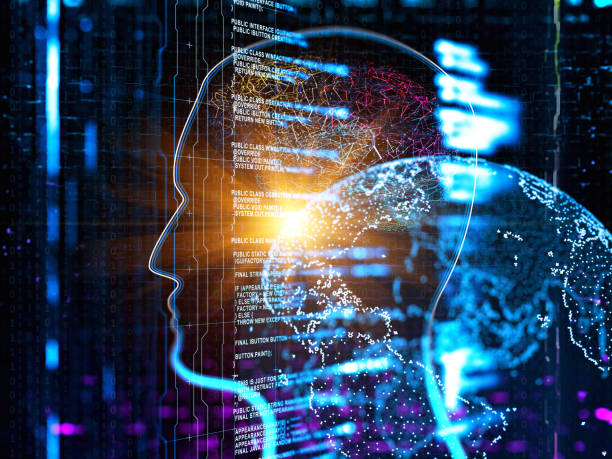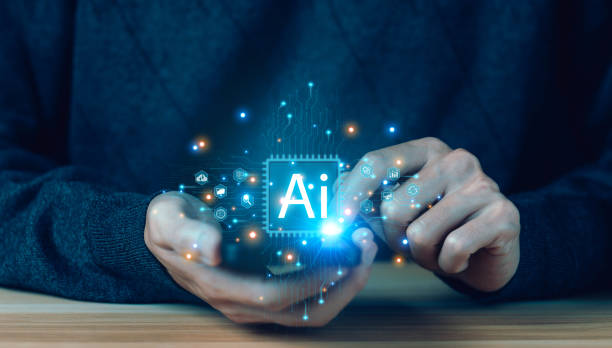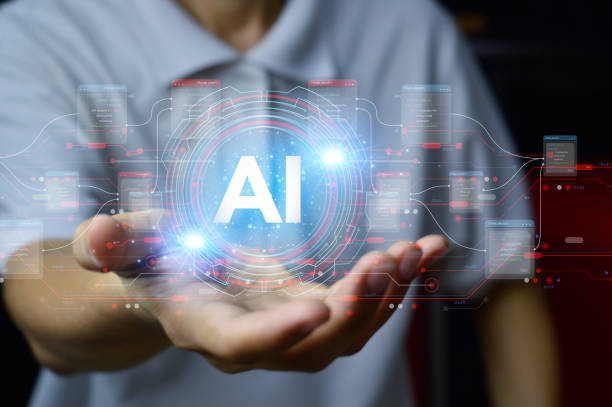What is Artificial Intelligence? Definitions and Basic Concepts
#Artificial_Intelligence (AI) is a branch of computer science that deals with building machines capable of performing tasks that typically require human intelligence.
These tasks include learning, problem-solving, pattern recognition, natural language understanding, and decision-making.
In other words, the goal of #Artificial_Intelligence is to create systems that can think and act like humans.
Artificial intelligence is not merely an abstract concept, but a powerful tool with widespread applications in various fields.
Artificial intelligence enables machines to learn from experience, adapt to new situations, and perform tasks that require thought.
Wikipedia offers a relatively comprehensive definition of artificial intelligence.
Artificial intelligence is essentially an effort to simulate human cognitive processes in machines.
This includes abilities such as reasoning, planning, learning, and language understanding.
Artificial intelligence systems can process vast amounts of data and identify patterns that are undetectable by humans.
One of the key concepts in artificial intelligence is machine learning.
Machine learning allows systems to learn from data and improve their performance without explicit programming.
Deep learning is also a subset of machine learning that uses deep neural networks to analyze data and extract features.
Are you tired of your company’s website failing to meet your expectations? With Rasaweb, design a professional website that showcases the true face of your business.
✅ Increase the attraction of new customers and sales leads
✅ Increase the credibility and trust of your brand with your audience
⚡ Get a free website design consultation!
Types of Artificial Intelligence in Terms of Ability and Performance
Artificial intelligence can be divided into several categories based on its abilities and performance.
One of these classifications is the distinction between weak artificial intelligence (Narrow AI) and strong artificial intelligence (General AI).
Weak artificial intelligence, also known as limited artificial intelligence, is designed to perform a specific task and has limited functionality within that domain.
Examples of weak artificial intelligence include facial recognition systems, voice assistants like Siri and Alexa, and product recommendation systems.
These systems are very efficient at performing their specific tasks, but they cannot perform tasks that they have not been programmed for.
Click here to preview your posts with PRO themes ››
In contrast, strong artificial intelligence refers to a system that can perform any task that a human is capable of doing, with the same level of ability.
Strong artificial intelligence is still in the development stage and no real examples of it exist.
Achieving strong artificial intelligence is one of the long-term goals of artificial intelligence researchers.
Another classification of artificial intelligence is based on its performance.
In this classification, we can refer to reactive systems (Reactive Machines), systems with limited memory (Limited Memory), systems based on the theory of mind (Theory of Mind), and self-aware systems (Self-Aware).
Reactive systems are the simplest type of artificial intelligence and only react based on current input.
Systems with limited memory can store past information for a short time and use it for decision-making.
Systems based on the theory of mind, which are still in the early stages of development, are able to understand the emotions and thoughts of others.
Self-aware systems are also the most complex type of artificial intelligence and have awareness and self-awareness.
Applications of Artificial Intelligence in Various Industries
#Artificial_Intelligence is rapidly penetrating various industries and transforming the way things are done.
In the field of healthcare, artificial intelligence is used for diagnosing diseases, developing drugs, and providing personalized care.
Artificial intelligence systems can analyze medical images with high accuracy and detect signs of diseases in the early stages.
In the automotive industry, artificial intelligence plays a key role in the development of self-driving cars.
Self-driving cars use artificial intelligence to understand their surroundings, make decisions about routes, and prevent accidents.
In the financial sector, artificial intelligence is used for fraud detection, risk management, and providing financial advisory services.
Artificial intelligence systems can identify suspicious patterns in financial transactions and prevent fraud from occurring.
In the manufacturing field, artificial intelligence is used to optimize production processes, predict machine failures, and control quality.
Artificial intelligence systems can analyze sensor data and identify problems before they occur.
Click here to preview your posts with PRO themes ››
In addition, artificial intelligence has widespread applications in other fields such as education, agriculture, and security.
In education, artificial intelligence is used to provide personalized training, evaluate student performance, and automate administrative tasks.
In agriculture, artificial intelligence is used to optimize irrigation, detect plant diseases, and predict crop yields.
In security, artificial intelligence is used for facial recognition, video data analysis, and identifying cyber threats.
| Industry | Applications |
|---|---|
| Healthcare | Diagnosing diseases, developing drugs, personalized care |
| Automotive | Self-driving cars, driver assistance systems |
| Financial | Fraud detection, risk management, financial advice |
| Manufacturing | Production optimization, failure prediction, quality control |
| Education | Personalized education, student evaluation |
Machine Learning and Deep Learning Concepts and Differences
Machine learning and deep learning are two related but different concepts in the field of #Artificial_Intelligence.
Machine Learning refers to a system that can learn from data and improve its performance without explicit programming.
In machine learning, algorithms use data to build models, and these models are used for prediction or decision-making about new data.
Machine learning includes various types of algorithms such as regression, classification, and clustering.
Deep Learning is a subset of machine learning that uses deep neural networks to analyze data and extract features.
Deep neural networks consist of multiple layers of nodes (neurons) that are connected to each other.
These layers allow the system to identify complex patterns in the data.
Deep learning is particularly suitable for unstructured data such as images, audio, and text.
The main difference between machine learning and deep learning is in the way features are extracted from the data.
In traditional machine learning, engineers must extract the relevant features from the data and provide them to the algorithm.
In deep learning, deep neural networks can automatically extract the relevant features from the data.
This makes deep learning very powerful for tasks that require complex understanding of data, such as facial recognition and natural language processing.
Are you dissatisfied with the low sales of your online store?
Rasaweb is your solution for having a professional and high-selling online store.
✅ Significant increase in sales and revenue
✅ Easy and enjoyable shopping experience for customers
⚡ Get a free consultation from Rasaweb right now!
Challenges and Limitations of Artificial Intelligence
#Artificial_Intelligence, despite its many potentials, also faces challenges and limitations.
One of the main challenges is the need for a large amount of training data.
Artificial intelligence systems need a huge amount of data to learn and improve their performance.
Collecting and preparing this data can be time-consuming and costly.
Another challenge is the issue of bias in the data.
If the training data is biased, artificial intelligence systems will also be biased and make unfair or discriminatory decisions.
For example, if a facial recognition system is trained using data that mostly includes faces of white men, it may perform poorly in recognizing faces of women or people of color.
In addition, artificial intelligence is still limited in understanding context and logical reasoning.
Artificial intelligence systems may have difficulty performing tasks that require a deep understanding of the subject and the ability to reason.
Also, the issue of security and privacy is one of the important challenges in the field of artificial intelligence.
Artificial intelligence systems can be misused and collect and analyze people’s personal information.
This requires strong security measures and strict regulations to protect people’s privacy.
The Future of Artificial Intelligence Opportunities and Threats
The future of #Artificial_Intelligence is bright and full of new opportunities.
With the advancement of technology, artificial intelligence will increasingly play a role in our daily lives and transform the way things are done.
Artificial intelligence can help solve complex problems in various fields, including climate change, incurable diseases, and poverty.
However, artificial intelligence also brings threats.
One concern is the replacement of human labor by machines.
By automating tasks, artificial intelligence can lead to job losses, especially in industries that require repetitive and routine skills.
To counter this threat, there is a need to invest in training and retraining the workforce so that people can learn new skills and work in jobs that require human skills.
Another concern is the issue of control and supervision of artificial intelligence.
With the advancement of artificial intelligence, systems may be created that are beyond human control.
To prevent this, there is a need to develop ethical principles and strict laws for the development and use of artificial intelligence.
It should also be ensured that artificial intelligence is used for the benefit of all members of society, and not just for the benefit of a particular group.
Artificial Intelligence and Its Role in Digital Transformation
#Artificial_Intelligence is one of the main drivers of digital transformation.
Digital transformation means using digital technologies to improve processes, provide new services, and create innovative business models.
Artificial intelligence plays a key role in this transformation because it enables organizations to analyze data more effectively, automate processes, and provide personalized experiences for their customers.
In the field of marketing, artificial intelligence helps organizations better understand their customers, design more targeted marketing campaigns, and increase conversion rates.
Artificial intelligence systems can collect and analyze customer data from various sources and identify patterns that help marketers optimize their messages and reach the right customers at the right time.
In the field of customer service, artificial intelligence helps organizations provide faster and more efficient services to their customers.
Artificial intelligence-based chatbots can answer customer questions, solve their problems, and guide them to the appropriate resources.
This reduces customer service costs and increases customer satisfaction.
| Area | Role of Artificial Intelligence in Digital Transformation |
|---|---|
| Marketing | Customer data analysis, targeted campaigns, increased conversion rates |
| Customer Service | Chatbots, faster response, reduced costs |
| Production | Process optimization, failure prediction, quality control |
| Human Resources | Hiring, training, performance management |
Skills Needed to Enter the World of Artificial Intelligence
Entering the world of #Artificial_Intelligence requires acquiring specific skills.
One of the most important skills is programming knowledge.
Programming languages such as Python, R, and Java are among the most widely used languages in the field of artificial intelligence.
Python, due to its simplicity and the existence of powerful libraries such as TensorFlow and PyTorch, is particularly popular for developing artificial intelligence systems.
In addition to programming, knowledge of mathematics and statistics is also essential.
Concepts such as linear algebra, calculus, and probability statistics are very important in understanding artificial intelligence algorithms and analyzing data.
Also, having knowledge in the field of machine learning and deep learning is also necessary.
You should be familiar with the types of machine learning algorithms, deep neural networks, and optimization techniques.
In addition to technical skills, soft skills are also important for success in the field of artificial intelligence.
Skills such as problem-solving, critical thinking, and teamwork help you analyze complex issues, provide innovative solutions, and collaborate effectively with others.
Also, having strong communication skills is essential to be able to express your ideas clearly and persuasively.
Are you tired of your online store website not generating as much revenue as its potential? Rasaweb, specializing in designing professional online store websites, solves this problem forever!
✅ Significant increase in sales and revenue
✅ High loading speed and unique user experience
⚡ Get a free online store website design consultation
Ethics in Artificial Intelligence Considerations and Responsibilities
#Artificial_Intelligence faces several ethical issues.
One of the most important issues is the issue of bias in algorithms.
As mentioned earlier, if the training data is biased, artificial intelligence systems will also be biased and make unfair or discriminatory decisions.
To prevent this, it must be ensured that the training data is diverse and representative of the target population.
Another issue is the issue of transparency and explainability of algorithms.
Some artificial intelligence algorithms, especially deep neural networks, are very complex and difficult to understand how they work.
This makes it difficult to trust these algorithms, especially in sensitive areas such as healthcare and criminal justice.
To increase the transparency and explainability of algorithms, there is a need to develop new techniques that allow us to understand how algorithms make decisions.
The issue of privacy is also one of the important ethical issues in the field of artificial intelligence.
Artificial intelligence systems can collect and analyze people’s personal information, and this information can be used for inappropriate purposes.
To protect the privacy of individuals, there is a need to develop strict laws for the collection and use of personal data.
Also, individuals should be given the opportunity to have more control over their data and be able to know how their data is being used.
Artificial Intelligence Learning Resources Courses and Books
To learn #Artificial_Intelligence, a variety of educational resources are available.
There are numerous online courses on platforms like Coursera, edX, and Udemy that teach the basics of artificial intelligence, machine learning, and deep learning.
These courses are usually taught by prominent university professors and include educational videos, exercises, and projects.
In addition to online courses, there are also many books on artificial intelligence.
Books such as “Artificial Intelligence: A Modern Approach” by Stuart Russell and Peter Norvig, “Machine Learning with Python” by Sebastian Raschka, and “Deep Learning” by Ian Goodfellow, Yoshua Bengio, and Aaron Courville, are among the reference books in this field.
These books comprehensively cover the basics of artificial intelligence and machine learning and are suitable for students and researchers.
In addition to courses and books, there are other resources for learning artificial intelligence.
Websites like arXiv and Papers with Code publish new scientific articles in the field of artificial intelligence.
Also, there are numerous online forums and groups where people can ask their questions, interact with others, and learn from their experiences.
Participating in conferences and training workshops can also be a good opportunity to learn artificial intelligence and network with experts in this field.
Frequently Asked Questions
| Question | Answer |
|---|---|
| What is the definition of Housh Masnoei (Artificial Intelligence)? | It is a field in computer science that aims to create intelligent machines that can think, learn, solve problems, and make decisions like humans. |
| Mention some common applications of artificial intelligence. | Includes self-driving cars, voice assistants (such as Siri and Alexa), recommendation systems (such as Netflix and Amazon), facial recognition, and medical diagnosis. |
| What is the difference between Narrow Artificial Intelligence (ANI) and General Artificial Intelligence (AGI)? | Narrow Artificial Intelligence is specialized in one specific task, while General Artificial Intelligence has a human intellectual ability to perform any cognitive task. |
| What is Machine Learning and its relationship to Artificial Intelligence? | Machine learning is a branch of artificial intelligence that focuses on developing algorithms that allow systems to learn from data without explicit programming. |
| What are Artificial Neural Networks? | They are computational models inspired by the structure and function of the human brain, and are used in deep learning to process data and discover complex patterns. |
| Mention some ethical challenges related to artificial intelligence. | Includes privacy issues, bias in data and algorithms, job loss, and liability in the event of errors or unfair decisions. |
| What is Natural Language Processing (NLP)? | It is a branch of artificial intelligence that focuses on enabling computers to understand, interpret, and create human language in a useful and interactive way. |
| How can artificial intelligence affect the labor market? | It can lead to the automation of some routine tasks, requiring the retraining of workers and the creation of new jobs in the areas of design, development, and maintenance of artificial intelligence systems. |
| What is Computer Vision? | It is a field in artificial intelligence that enables computers to “see,” understand, and interpret images and videos in the same way as humans, enabling them to recognize objects and faces. |
| What is the importance of data in developing artificial intelligence systems? | Data is the fuel that feeds artificial intelligence systems, especially in machine learning. The quality and quantity of data greatly affect the accuracy and performance of the models and their ability to learn and make correct decisions. |
And other services of Rasa Web Advertising Agency in the field of advertising
Smart Marketplace: Professional optimization for analyzing customer behavior using key page optimization.
Smart Brand Identity: Designed for businesses looking to improve SEO rankings through the use of real data.
Smart Custom Software: Transform online growth by helping optimize key pages.
Smart Google Ads: Transform campaign management with intelligent data analysis.
Smart Brand Identity: Professional optimization for digital branding using Google Ads management.
And more than hundreds of other services in the field of internet advertising, advertising consulting and organizational solutions
Internet Advertising | Advertising Strategy | Advertorial
Resources
Artificial intelligence; Beyond a tool, a partner and a threat?
,What is artificial intelligence? Its applications, advantages and disadvantages
,Artificial intelligence and its many applications
,Familiarity with the concepts of artificial intelligence
? Rasaweb Afarin Digital Marketing Agency helps your business on the path to digital success by providing comprehensive and innovative solutions. We are with you in every step of the way, from strategy to implementation, to have a strong presence in the online space.
Are you looking for a dramatic transformation in your business? We have the expertise to achieve your goals. With services such as website design with a modern user interface, SEO, social media management and targeted advertising campaigns, we increase your website traffic and improve conversion rates.
Let Rasaweb Afarin unleash the full potential of your business in the digital world. Contact us today for a free consultation and to learn more about our services and join our successful customers.
📍 Tehran, Mirdamad Street, next to the Central Bank, South Kazerun Alley, Ramin Alley, No. 6









